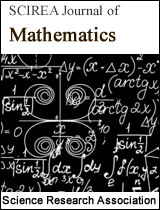Unbiased estimators of two second-order moments of the covariance matrix
DOI: 10.54647/mathematics110384 91 Downloads 16716 Views
Author(s)
Abstract
The covariance matrix, employed for measuring the linear correlation between variables, plays a vital role in data analysis, such as statistical prediction and hypothesis testing. When the data dimension is high, the traditional sample covariance matrix is not an ideal estimator of the population covariance matrix anymore, resulting in degradation or even inaccuracy of the second-order moment estimators' performance based on the sample covariance matrix. This paper studies the unbiased estimators of the second-order moments under complex Gaussian distribution. The proposed unbiased estimators have better statistical properties and numerical performance than the existing estimation methods.
Keywords
Covariance matrix, second-order moments, complex Gaussian distribution, unbiased estimators
Cite this paper
Xuanci Wang, Wei Yi, Bin Zhang,
Unbiased estimators of two second-order moments of the covariance matrix
, SCIREA Journal of Mathematics.
Volume 8, Issue 1, February 2023 | PP. 39-50.
10.54647/mathematics110384
References
| [ 1 ] | A. Jukić, T. van Waterschoot, T. Gerkmann, and S. Doclo, “Multi-channel linear prediction-based speech dereverberation with sparse priors,” IEEE/ACM Transactions on Audio, Speech, and Language Processing, vol. 23, no. 9, pp. 1509–1520, 2015. |
| [ 2 ] | Z. Li, J. Liu, S. Zhang, Y. Yu, H. Liang, Q. Lu, J. Chen, Y. Han, F. Zhang, and J. Li, “Novel potential metabolic biomarker panel for early detection of severe COVID-19 using full-spectrum metabolome and whole-transcriptome analyses,” Signal Transduction and Targeted Therapy, vol. 7, p. 129, 2022. |
| [ 3 ] | Y. Xiao, D. Ma, Y. Yang, F. Yang, J. Ding, Y. Gong, L. Jiang, L. Ge, S.-Y. Wu, Q. Yu, Q. Zhang, F. Bertucci, Q. Sun, X. Hu, D. Li, Z. Shao, and Y. Jiang, “Comprehensive metabolomics expands precision medicine for triple-negative breast cancer,” Cell Research, vol. 32, p. 477–490, 2015. |
| [ 4 ] | E. Ollila and A. Breloy, “Regularized tapered sample covariance matrix,” IEEE Transactions on Signal Processing, vol. 70, no. 1, pp. 2306–2320, 2022. |
| [ 5 ] | A. Moore, S. Hafezi, R. Vos, P. Naylor, and M. Brookes, “A compact noise covariance matrix model for MVDR beamforming,” IEEE/ACM Transactions on Audio, Speech, and Language Processing, vol. 30, pp. 1–14, 01 2022. |
| [ 6 ] | D. Luong, B. Balaji, and S. Rajan, “Structured covariance matrix estimation for noise-type radars,” IEEE Transactions on Geoscience and Remote Sensing, vol. 60, pp. 1–13, 2022. |
| [ 7 ] | K. W. Chan, “Mean-structure and autocorrelation consistent covariance matrix estimation,” Journal of Business & Economic Statistics,vol. 40, no. 1, pp. 201–215, 2022. |
| [ 8 ] | E. Raninen and E. Ollila, “Bias adjusted sign covariance matrix,” IEEE Signal Processing Letters, vol. 29, pp. 339–343, 2022. |
| [ 9 ] | W. WU and M. Pourahmadi, “Nonparametric estimation of large covariance matrices of longitudinal data,” Biometrika, vol. 90, no. 4, p. 831–844, 2003. |
| [ 10 ] | P. J. Bickel and E. Levina, “Covariance regularization by thresholding,” The annals of statistics, vol. 36, no. 6, pp. 2577–2604, 2008. |
| [ 11 ] | R. T. Bengtsson, “Estimation of high-dimensional prior and posterior covariance matrices in Kalman filter variants,” Journal of Multivariate Analysis, vol. 98, no. 2, pp. 227–255, 2007. |
| [ 12 ] | O. Ledoit and M. Wolf, “A well-conditioned estimator for large-dimensional covariance matrices,” Journal of Multivariate Analysis, vol. 88, no. 2, pp. 365–411, 2004. |
| [ 13 ] | M. Sumair, T. Aized, M. M. Aslam Bhutta, F. A. Siddiqui, L. Tehreem, and A. Chaudhry, “Method of four moments mixture-a new approach for parametric estimation of Weibull probability distribution for wind potential estimation applications,” Renewable Energy, vol. 191, pp. 291–304, 2022. |
| [ 14 ] | X. Ding, “Some sphericity tests for high dimensional data based on ratio of the traces of sample covariance matrices,” Statistics & Probability Letters, vol. 156, p. 108613, 2020. |
| [ 15 ] | T. J. Fisher and X. Sun, “Improved stein-type shrinkage estimators for the high-dimensional multivariate normal covariance matrix,” Computational Statistics & Data Analysis, vol. 55, no. 5, pp. 1909–1918, 2011. |
| [ 16 ] | B. Zhang, “Improved shrinkage estimator of large-dimensional covariance matrix under the complex Gaussian distribution,” Mathematical Problems in Engineering, vol. 2020, pp. 1–8, 07 2020. |
| [ 17 ] | J. A. Tague and C. Caldwell, “Expectations of useful complex Wishart forms,” Multidimensional Systems and Signal Processing, vol. 5, pp. 263–279, 1994. |
| [ 18 ] | J. Li, J. Zhou, and B. Zhang, “Estimation of large covariance matrices by shrinking to structured target in normal and non-normal distributions,” IEEE Access, vol. PP, pp. 1–1, 12 2017. |
| [ 19 ] | X. Tian, Y. Lu, and W. Li, “A robust test for sphericity of high-dimensional covariance matrices,” Journal of Multivariate Analysis, vol. 141, pp. 217–227, 2015. |
| [ 20 ] | M. S. Srivastava, “Some tests concerning the covariance matrix in high dimensional data,” Journal of the Japan Statistical Society. Japanese issue, vol. 35, pp. 251–272, 2005. |

